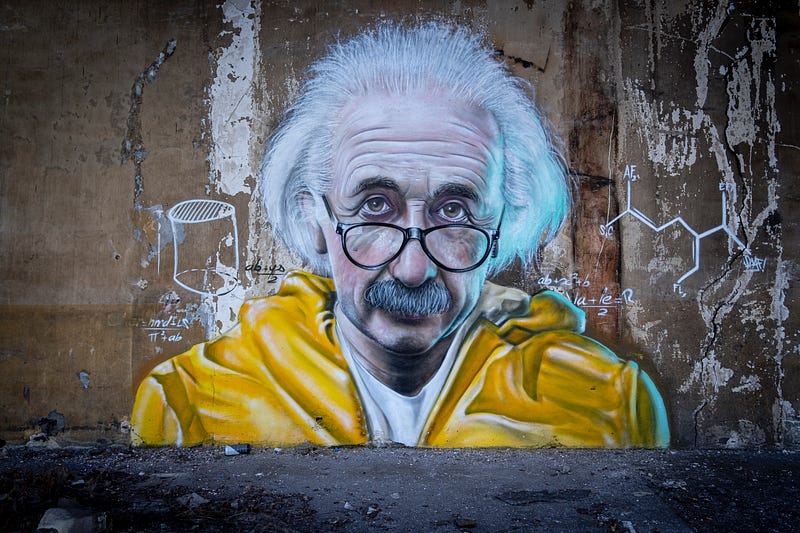Cultivating Curiosity: Embrace Your Inner Scientist Like Einstein
Written on
Chapter 1: The Art of Curiosity
The allure of exploration and experimentation is undeniable.

“I am neither clever nor especially gifted. I am only very, very curious.” — Albert Einstein
From a young age, I was captivated by the genius of Albert Einstein. I vividly recall the day my parents introduced me to a set of World Book Encyclopedias. Upon discovering the section on the Theory of Relativity, I was hooked. Daily, I filled my notebook with notes about Einstein, dedicating countless hours to memorizing his biography and analyzing his groundbreaking theories. His insatiable curiosity ignited my own.
To become a successful writer or entrepreneur, nurturing your curiosity is essential.
Section 1.1: Understanding Curiosity
“We know that new ideas often emerge from the intersection of diverse fields, flourishing in the mind of someone with broad knowledge.” - Ian Leslie
Ian Leslie argues that curiosity embodies a blend of intelligence, determination, and a thirst for novelty. He refers to this as a "trait cluster." In his book, Curious: The Desire to Know and Why Your Future Depends on It, Leslie weaves compelling stories with research insights from various disciplines. He emphasizes the importance of maintaining intellectual engagement as we age and face increasing demands on our time. Below are key takeaways from his work to help us cultivate our curiosity.
“When you encounter something intriguing, set aside everything else and explore it.” - B.F. Skinner
To enhance your curiosity, consider these strategies:
- Expand Your Reading: Broaden your learning by immersing yourself in various fields. For instance, if your focus is on blogging or affiliate marketing, delve into literature on science, view documentaries on art and design, or explore astronomy and captivating historical facts.
- Inquire Boldly: Don’t hesitate to ask questions. As Mike Parker aptly notes, many leadership failures stem from the inability to inquire. Visionaries like Einstein and Stephen Hawking exemplified relentless questioning, challenging their theories and those of previous thinkers.
- Generate Ideas: Cultivating fresh ideas can revolutionize your life. Daily exercises in idea generation can sharpen your creativity. Entrepreneur James Altucher suggests jotting down ten ideas daily to strengthen your creative muscle. “The right idea will find you,” he asserts.
- Learn from Errors: “Anyone who has never made a mistake has never attempted something new.” - Albert Einstein
Mistakes signal that you're pushing your limits and engaging in more complex endeavors. Reflecting on failures provides invaluable lessons, akin to learning to ride a bike without training wheels. Research from the Baycrest Centre for Geriatric Care indicates that making mistakes enhances memory retention for the correct information.
Chapter 2: Embracing a Scientific Mindset
In the video "Breakthrough - how to think like a scientist and embrace the unknown," the speaker discusses how adopting a scientific approach can transform your thinking process, encouraging you to embrace uncertainty and explore new ideas.
Thinking like a scientist is more than maintaining an open mind; it’s about being actively inquisitive. It involves seeking out potential flaws in our reasoning rather than just validating our beliefs. This mindset is crucial for scientific inquiry, which relies on forming hypotheses and testing them against reality.
The skills essential for thinking like a scientist include:
- Observation: Pay close attention to your surroundings and note anything unusual.
- Questioning: Continuously wonder why things occur as they do and consider alternative explanations.
- Experimentation: Develop experiments to validate your hypotheses and collect data to confirm your predictions.
By refining these skills, you can enhance your scientific thinking and deepen your understanding of the world.
The video "Thoughts Beyond Science and Spirituality with Jeff Lieberman" delves into the intersections of science and spirituality, highlighting the importance of curiosity in exploring both realms.
Section 1.2: Curiosity in Writing
As a writer, fostering curiosity is vital for generating new ideas, honing your craft, and connecting with your audience. Asking questions about the world around you can lead to fresh insights. For example, ponder why the sun rises in the east or how animals adapt to environmental changes. Such inquiries can inspire new perspectives and ideas for your writing.
Seeking new experiences also fuels curiosity. Whether it’s navigating a new city or trying unfamiliar cuisine, broadening your horizons can enhance your worldview.
Reading widely enriches your understanding of diverse cultures and perspectives, enabling you to cultivate innovative ideas for your writing. By nurturing your curiosity, you can become a more effective writer and forge deeper connections with your readers.
Final Thoughts
Einstein's relentless curiosity was a cornerstone of his success. He questioned conventional wisdom and sought deeper understanding, famously stating, “I have no special talents. I am only passionately curious.” This mindset empowered him to perceive the world uniquely and develop revolutionary theories that reshaped our understanding of the universe.
If you aspire to emulate Einstein, nurture your curiosity. When faced with challenges, resist the urge to accept initial explanations. Instead, probe deeper and explore the underlying reasons. By continually questioning the status quo, you’ll unlock fresh insights and innovative ideas that can lead to transformative change.